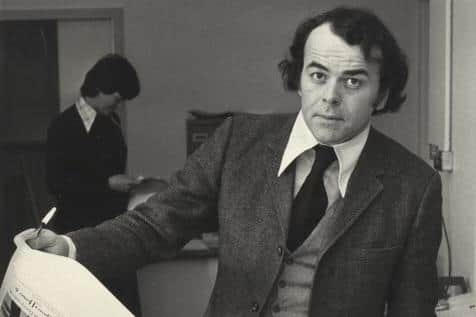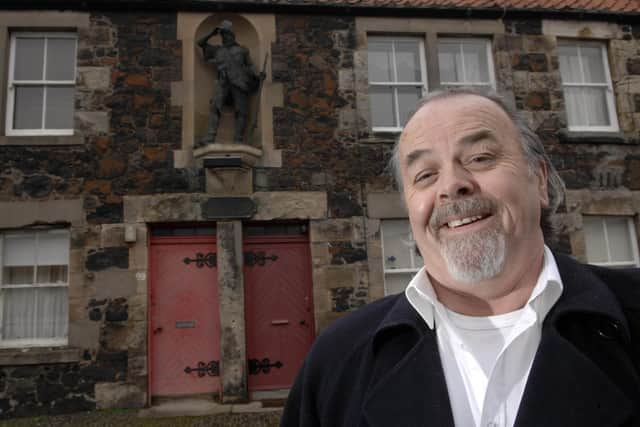Obituaries: Rick Wilson, editor of The Scotsman's first colour magazine
Rick Wilson was a man with two missions in his chosen field of the printed word.
His first was to introduce colour to the monotone of Scottish newspapers, through his founding editorship of The Scotsman's colour magazine in 1980. The second was to bring new enlightenment, through books, to those who might know some famous Scottish names but might not be familiar with the finer details of their fame.
Advertisement
Hide AdAdvertisement
Hide AdSince the “risky experiment” of the Sunday Times colour magazine in 1962, the concept of free newspaper colour mags had caught on widely down south and by the mid-1970s their potential for attracting high-end advertising hadn't escaped the notice of Scottish news publishers. Someone had to bite the bullet. But that bite having been taken, where could a Scot – ideally – be found who could create the product?


The answer was Amsterdam. Rick, a Montrosian then in his mid-thirties, had been editing English-language magazines there after a career starting with the local paper. He had risen to become a sub-editor with a DC Thomson teenage magazine, then the Herald, followed by the Scottish Daily Express and the Fleet Street Express. Then he went Dutch...
It was an exciting time in the Dutch capital... living in a canalside flat with two tall windows, one floor above the wafting of passer-bys' exotic aromas. His first clog in the water was with Holland Herald, the KLM in-flight magazine, which led to more such deputy editor posts as he boomeranged across the North Sea on a variety of magazines...to The Point International, a global glossy published from Antwerp; Europa magazine; and Time&Tide, a British news magazine, in London. But it was when he was back in his much-missed Amsterdam, editing the expatriate community magazine, Holland Life, that the call came...
In early 1990, Eric Mackay – the then-retired Scotsman editor– recalled to Rick: “Just over ten years ago, I made the presentation to the [Thomson] board for permission to start a colour mag, and it was a classic example of the blind winning over the totally ignorant. All I had to do was find the right man, and there you were. You did a marvellous job. The mag was your own and no one can take that away from you.”
Rick was living by now with his wife Alison and family in Edinburgh. What always amused him about his own career was the way it started. His police-sergeant father was doing his torchlit round of the streets of Montrose when he came upon the blazing lights of the Standard Press office. There, sitting at the Linotype machine and writing his stories directly into hot metal, was editor Duncan Fraser. Asked why he was working so late, he said breathlessly: “Short staffed.”


Sgt Wilson jumped in immediately. Revealing that his son – in the fourth year at Montrose Academy – was “quite creative”, he got the terse response: “Send him in tomorrow morning.”
Rick's first reporting week got off to a great start – when Wee Willie Harris (“Britain's answer to Little Richard”) appeared at the local ballroom and submitted himself to an interview with one overawed fan. It gave Rick a taste for mingling with the stars and, by the time he'd moved down the road to the DC Thomson fun factory in Dundee, he was dubbed Paul Destiny for his column A Date with Destiny, in a new teenage girls' magazine.
There followed a series of one-on-ones with rock heroes like Billy Fury, Adam Faith and Joe Brown. Later starry contacts included Scots Lulu and Jackie Stewart, who appeared in the context of Scotia, a Glasgow-based young Scots' start-up which lured him out of Fleet Street. It was when it failed to take off that he took himself off to The Netherlands. There, more big names fell to his tape recorder. These included Don McLean, John Lennon, and – the one of which he was most proud – Rod Steiger.
Advertisement
Hide AdAdvertisement
Hide AdThe big US star had just been called – by Michael Parkinson – “the best actor in the world”. And there he was, a few tables away in the Pulitzer Hotel bar. As the great man drank up and stood up, Rick followed and told him he was setting up a Scottish magazine; any chance of a scoop? He raised his eyes to the ceiling, thought for a moment, then sighed: “OK, see you here same time tomorrow.” No agents or PR people involved...
And so it was that the monthly Scotsman mag made quite an impact with its first issue, with the Hollywood megastar telling all about his previously unrevealed trials and tribulations.
Alas, it was not to be forever. Ten years after its start, the paper's directors decided they needed a weekly, female-focused magazine with their new Scotland on Sunday, which needed a female editor. Regrettably, Rick was unable to oblige, though he soon re-emerged (recalling his rock-drumming days) with new “gigs” on the Herald, Daily Telegraph, and Sunday Mirror. He was nothing if not eclectic.
As retirement approached, Rick was urged to take up a hobby... and obliged, in this case, not just with a veritable gallery of vivid acrylics using his page-editing layout talents but with a handful of books in various genres. Of 11 titles published, four were fiction, four historical and three about famous Scottish names whose fame, he felt, needed more explanation: notably, Deacon Brodie, Alexander Selkirk and Robert Fergusson, the young poet who inspired Burns.
All of which sounds very worthy. But Rick made no secret of the fact that his last effort, The Man Who Would Be Elvis – about a local Presley impersonator called to the big time – was his favourite. “It was just a bit of nonsense,” he said. “Which makes good sense to me.”
Rick Wilson is survived by his wife Alison, their children Charlotte and Harry and seven grandchildren; and his son Chris from a previous marriage.
OBITUARIES
If you would like to submit an obituary (800-1000 words preferred, with jpeg image), or have a suggestion for a subject, contact [email protected]
SUBSCRIBE
Subscribe at www.scotsman.com/subscriptions
Comments
Want to join the conversation? Please or to comment on this article.
